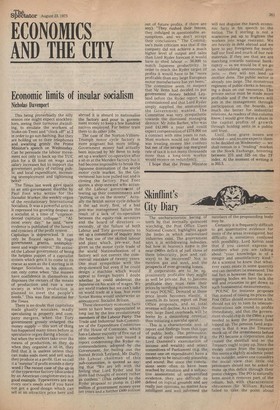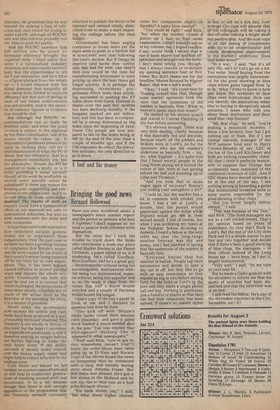Skinflint's City Diary
The uncharacteristic baring of teeth by that normally quiescent watchdog, the Post Office Users National Council, highlights again the limbo in which nationalised industries exist. The goyernment says it is withdrawing Subsidies, but how in heaven's name is the near-£900m deficit of just three of them (electricity, post and railways) to be recovered? Not to mention gas and steel, and the prospects of ever-growing losses.
If corporatons are to be approximately profitable they might as well be private. But to become profitable they must raise their prices by terrifying increments. Not so says POUNC. Demand at these price levels becomes elastic, it asserts in its latest report on Post Office proposals, and so total revenue will decline. As a result the very large fixed overheads will be borne by a dininishing revenue, thus initiating a suicidal spiral. • This is a characteristic sort of report and findings from this type of public body. The pronouncements of royal commissions (e.g. Lord Diamond's examination of income and wealth) and select committees of Parliament (e.g. the, recent one on expenditure) have a tendency to be intuitively plausible and sound. But since the conclusions seem often to have been reached by intuition and a subjective assessment of unquantified evidence, they are difficult to defend on logical grounds and are really just opinions, no matter how intelligent and well informed the members of the propounding body may be.
Certainly it is frequently difficult to get quantitative evidence for many of the areas investigated, but difficulty is sometimes confused with possibility. Lord Kelvin said that if you cannot express in numbers what you are talking about "your knowledge is of a meagre and unsatisfactory kind." As a scientist he knew that whatever exists exists in some quantity and can therefore be measured. The sad fact is however that the investigating bodies we have lack the will and resources to get down to such fundamental measurements.
POUNC for instance proposes that instead of raising its prices the Post Office should economise a bit, should not try to turn its telecommunications side round to profits immediately, and that the government should chip in the £90m a year needed to keep the pension fund topped up. The pension fund argument is that it was the Treasury muck-up of the investments before the PO became a corporation that caused the shortfall and so the Treasury ought to pay up. Since the money comes from the taxpayer this seems a slightly academic point to an outsider, unless one considers the social view that little old pensioners should not be asked to make ti this deficit through their postal ch ges. The PO is naturally keen sinc ' it removes part of the odium, but. with characteristic obtuseness JSir William Ryland failed to t ke the point about
telecoms. He grumbled that he was berated for making a loss of telecorns and then caned for trying to make a profit, although all POUNC said was that this was probably not the time to push for profits.
And the POUNC assertion that £30 million can be saved by increased efficiency brought the expected reply. I must admit that were I a nationalised industry chairman and some totally external body had the impertinence to tell me I can streamline and save £Xm — a figure plucked from the empty air — I would respond with the bland dismissal that naturally all was being done further to improve efficiency but that sort of saving in view of our recent achievements was not possible. And in the absence of contrary figures or evidence that would be that.
But although the POUNC recomrriendations can so easily be brushed aside, and even the price increase is subject to the approval by the Price Commission, one of its points should be taken up. It responded to persistent pressure by users by backing their call for a total examination of what the PO iS about. Not the efficiency, that is a management consultancy job, but the philosophy. Should the PO be expected to make a profit, or is it really providing a social ,service? Should all its work be profitable or should some specific areas be subsidised? Is there any reason for keeping post, engineering and telephones in one corporation, and if so should there be some cross-subsidisation? The results of such an enquiry could have a fundamental effect on our approach not only to nationalised industries, but also to their relations with the state and with companies.
It is perhapsnaive to be su prised at how responsive socialist governments are to arguments from industrialists. Over the past year or so there has been a growing volume of complaints that Britain's economic ills were caused by too much of the country's money being creamed off by the state for its own expenditure. This, it has been argued, caused inflation in several parallel ways and distorts the whole economy. Emotionally one feels this must be true yet it is curious that when challenged, the proponents of these ideas usually complain not so much of the actual level as the direction of the spending. So often, it is a matter of priorities.
Never mind, the government now accepts the notion and cash limits have been proposed as a way of ensuring limits are observed. The Treasury is not wholly in favour of this view, but the Select Committee on Expenditure predictably is and is therefore putting its weight behind the faction fighting to make the cash limits work. If the policy succeeds it should make control over the money supply easier and might help to reduce inflation in the medium term.
Cash limits are bound to fall hardest on current expenditure and so will help to counteract generations of mucking around with real investment. It is a bit sinister though that there is still enough • opposition to the programme that the Treasury seemed curiously reluctant to publish the limits to be imposed and seemed totally disinclined even to make a start imposing the ceilings before the next budget.
Government has been urging companies to invest more yet the signs seem to point to a further fall in investment next year following this year's decline. But if things do improve (and surely they cannot stay this bad for ever, can they?) then now would be the time for manufacturing investment to start picking up since the lean times get longer anyway. It is perhaps the depressing investment pro-grammes which more than anything succeeded in pushing the FT Index down even lower. Interest in shares over the past few months has been declining steadily, if the bargains marked are any indication, and this has been accompanied by a strong downtrend in th.e• index since the beginning of June. Fewer City people are now prepared to bet on the index being at 400 by the end of the year than a couple of months ago, and if the CBI responses do reflect the prevalent attitudes, the only direction to go is down.



































 Previous page
Previous page